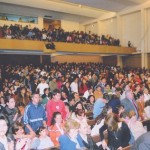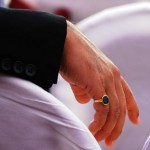The American political sphere is something like a gladiator’s ring taken over by staggering drunks wielding clubs. Everybody hates everybody else; hatred is a prerequisite for entry. The Occupy Wall Street movement throws our polarized culture into a stark light: the Right wants to denounce the protesters as a rabble of lazy, entitled hippies. The Left wants to assimilate them into its weak, bloated ranks of ineffectual bureaucrats. What does the religious world do with this situation?
I know what it shouldn’t do. It shouldn’t dismiss the protesters as lazy rabble looking for handouts. That caricature does not belong in the hearts of compassionate people, especially people who claim to follow the words of the great flattener of human egos, Jesus Christ. Sell what you have and give to the poor, he said, if you want to have treasure in heaven. If you have two coats, give one to someone who has none.
I am the 99% and the 1%.
I was raised lower middle class and became poor. My family never owned a home. My parents did not have bachelor’s degrees. My father left my mother, who hadn’t worked in over a decade, and then got sick and lost his own job. I almost had to quit community college because I couldn’t afford to continue going there, despite working 35 hours in retail. The company I worked for wouldn’t give me a 40-hour week, because if they did they’d have had to give me benefits. I had crooked teeth until my twenties, and my braces were half paid for by public assistance. I paid for the car my mother and I shared, and when I went to college full time, it was repossessed. I am the 99%.
I worked hard. I graduated at the top of my class, with honors and two foreign languages. I went to one of the best universities in the world and got a master’s degree. I am now a student at a prestigious graduate school, employed teaching some of the next generation for a lower-middle-class stipend while I study. I can afford to share an apartment with my partner and I finally bought a (very used) car of my own. I have good health and good friends. In a sense, I’m also the 1%. I’ve had the chance to go places and do things that most people don’t get to do. I wish I were not such an exception in that respect.
I do not believe that I made myself. I vowed to myself when I went to college that I would take every opportunity, that I would do my utmost in everything. I believed in independence and hard work. I still do. But I know that I was able to go to college only because my parents did not forbid it (unlike many families in fundamentalist groups like the Message). I was able to stay in college because I was given a generous financial aid package and the administrators worked in my favor. I graduated with a perfect GPA because I was so sure that if I got the best grades in my school, no one would kick me out if I couldn’t afford to graduate. I was right. But I also got good grades because I had the rare luxury of no outside crises impacting my ability to focus. No one in my family died while I was in college; I didn’t get sick; I didn’t have a child to raise; I didn’t have to care for any elderly relatives. I was able to go and do a master’s degree at a university many people see only in the movies, because federal loans were available to help me. If they had not been there, I could not have earned enough money in time, nor could my parents. Throughout college, I had professors who believed in me, who told me that I was smart and could make something of myself. I am one of the luckiest people in the world.
I am still making something of myself, and I think I’m closer to having done so than ever before. But other people made something of me, too. I am profoundly grateful to them. They saved me, even though I also saved myself. No person can be wholly rescued by another, nor can she wholly rescue herself. I want the world to return to a model of gratitude, of compassion, of a recognition of the interdependent web of our existence. I could not have made it on my own – not because I was weak, or unwilling to work as hard as I could, but because no one can.
I hope that when my feet are firmly on the ground, if my hard work is rewarded with the good luck of a successful career, I will be in a position to hold my hand out to others. (When did hand-outs become so evil? When did we cease to take joy in others’ success?) I hope I will live to see a world in which “paying it forward” returns to common parlance. I hope education and health are available to more than they were when I first went to school. I hope fewer girls grow up to be told by their parents and pastors that educating them is a waste of time. I hope fewer workers blame themselves for their low wages, and fewer executives think they alone are meritorious. I challenge you to identify any human being who has not been helped somehow and who has nonetheless succeeded. I challenge you to ask yourselves a question I am also asking of myself, “How can I lift up those who come after me? How can I hold open the door I once walked through myself?”











